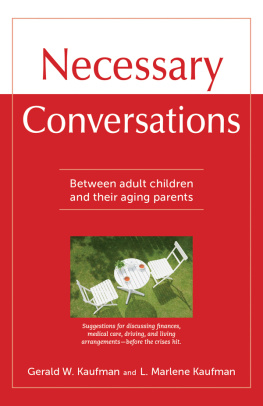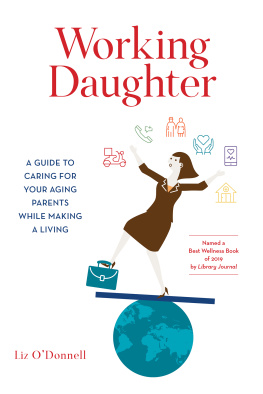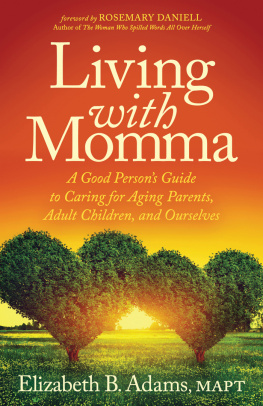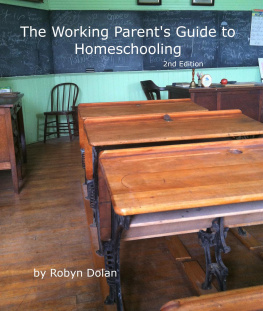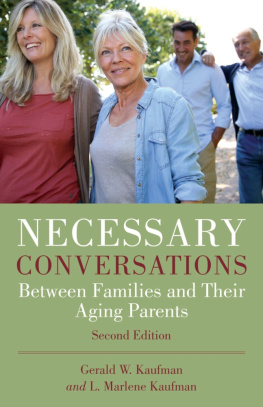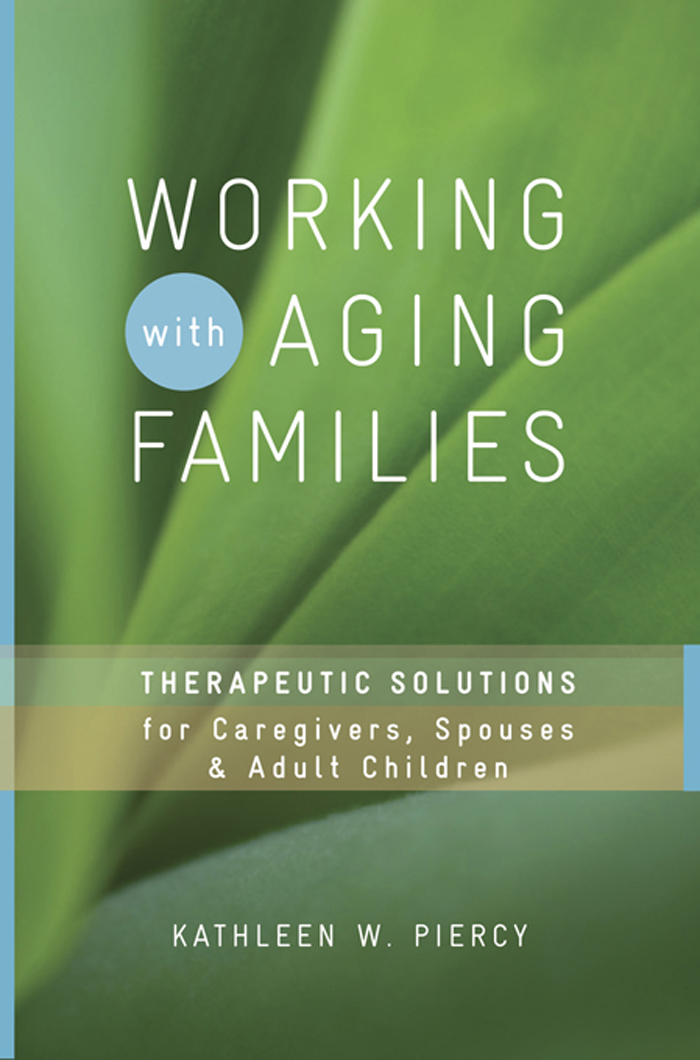Working With Aging Families
A NORTON PROFESSIONAL BOOK
WORKING with AGING FAMILIES
Therapeutic Solutions for Caregivers,
Spouses, Adult Children
KATHLEEN W. PIERCY

Copyright 2010 by Kathleen W. Piercy
All rights reserved
Printed in the United States of America
First Edition
For information about permission to reproduce selections from this book,
write to Permissions, W. W. Norton & Company, Inc., 500 Fifth Avenue,
New York, NY 10110
For information about special discounts for bulk purchases,
please contact W. W. Norton Special Sales
at specialsales@wwnorton.com or 800-233-4830
Manufacturing by R. R. Donnelly, Harrisonburg
Production manager: Leeann Graham
Library of Congress Cataloging-in-Publication Data
Piercy, Kathleen W.
Working with aging families : therapeutic solutions for caregivers, spouses, & adult children / Kathleen W. Piercy. 1st ed.
p. cm. (A Norton professional book)
Includes bibliographical references and index.
ISBN 978-0-393-73282-5 (hardcover)
1. Social work with older people. 2. Intergenerational relations. 3. Family therapy. I. Title.
HV1451.P534 2010
362.6dc22 2010009291
ISBN: 978-0-393-73282-5
W. W. Norton & Company, Inc., 500 Fifth Avenue, New York, N.Y. 10110
www.wwnorton.com
W. W. Norton & Company Ltd., Castle House, 75/76 Wells Street, London
W1T 3QT
1 2 3 4 5 6 7 8 9 0
I dedicate this book to my parents,
Thomas Patrick Walsh III, and the late
Dolores Vivian Walsh.
I also dedicate this book to the many clinical and
research families who taught me so much about
living life and facing death with grace and dignity.
C ONTENTS
A CKNOWLEDGMENTS
N o book would ever be completed without the love, patience, and hard work of key persons in an authors life. I would like to thank the following persons, who in various ways, contributed to the writing of this book: My mentor, Rosemary Blieszner, for suggesting to Norton that I might be a good choice for this endeavor. Your support and guidance throughout my career has provided me with many opportunities I might otherwise have missed. Two faculty members in my department at Utah State, Thorana Nelson and Linda Skogrand, were instrumental in advising me on how to tackle a book project and what content would be useful to therapists. Teresa Bodrero, staff assistant in our department, was most helpful with the formatting skills that I lack.
On a personal note, I wish to thank my daughter Andrea for her input and careful editing during the writing of the prospectus for this book. My husband, Bill, graciously endured countless hours of solitude during the writing of the manuscript. Several family members and friends shared with me their experiences of caring for older adults in both professional and personal settings, and I am grateful to them. Finally, to my editor, Andrea Costella, I offer my utmost gratitude in seeing me through this process. I could not have done it without any of you.
Working With Aging Families
Introduction
M y background includes 18 years as a clinical social worker in both a community mental health center and a private practice. I have spent 15 years as a researcher of aging family issues. As a researcher, I have conducted several studies of older adults and their families. I have interviewed both healthy adults at play, providing care, and doing volunteer work, and disabled seniors who needed daily care from family and paid caregivers. All of them have impressed me with their energy and ability to face lifes challenges and difficulties with as much courage as they could muster.
Some of their situations were so striking that I recall them vividly. Early in one study, I spoke with a 93-year-old widower who was being cared for by two daughters and a dedicated home health aide. His voice was not strong enough to be recorded, and his stamina was quite limited because of advanced coronary disease, but he answered my questions as best he could, and smiled. Later, his daughter told me that he had been hospitalized numerous times for heart problems. When I interviewed her afterward, she commented that she always left the room as soon as someone came to visit him (as she had done with me) so that the person would talk to him and not to her about him. He is still a person, and he understands everything you have to say, she said.
I also remember vividly an 80-year-old widow who was a gifted quilter. Her work had won many awards. I was interviewing her to learn more about how this popular leisure activity could be a source of growth and development in late life. I learned so much more. She lived alone. Her faithful companion, a boisterous canary in her living room, chirped happily in response to every answer she gave me. She took great pride in her quilts, but she was even more excited about teaching her skills to others. Producing another generation of creative quilters was what kept her going and, in her words, what kept her young.
Finally, I recall the married man in his mid-60s who had served as a disaster relief volunteer. Encouraged by a friend to get involved in disaster relief following Hurricane Katrina, he was reluctant to go, unsure of what knowledge or skills he had to offer to others. By the time his few weeks of 24/7 volunteer work were over, he had organized the construction of a tent city that would be used by other relief workers for months to come. He subsequently became highly trained in disaster preparedness; now, back at home, he was involved in training and assisting others in regional disaster relief efforts. He felt that his volunteer work had benefited him so much more than what he had given to others.
All these examples feature persons who, although in various stages of life and health, were engaged in making the most of their lives. None of them was without scars or health issues. But, not all persons approach the challenges of aging with such positive attitudes and behaviors. Some people fear death and experience despair in their late years, often brought on by failing health and multiple losses, both expected and unexpected. Their families may or may not provide them with the support they need to address their feelings and concerns about aging and its challenges. These seniors and their families often can benefit from professional guidance and knowledge of resources that may assist them in navigating tough times.
The baby boom generationfully one-third of the current U.S. populationis aging rapidly. In the U.S., 20% of the population will be age 65 or older by 2030 (Siegel, 1996). When all baby boomers have reached their 65th birthday, 20% of Americans will be considered old, with the fastest growing segment of the U.S. population composed of persons age 85 and older (He, Sengupta, Velkoff, & DeBarros, 2005).
But its important to keep in mind that aging today does not mean what it did a generation or more ago. Today, advances in medical treatment, coupled with improved lifestyle practices, have led to dramatic increases in life expectancy, which now ranges from 7882 years (Kinsella & He, 2009).
Moreover, our perception and attitude towards aging has drastically changed. Old age is socially defined as 65, the age at which eligible individuals can draw full retirement benefits from the U.S. Social Security system. However, some adults label themselves middle-aged until they are well into their 70s or 80s. Age is increasingly becoming more a state of mind and lifestyle than a socially imposed condition.




